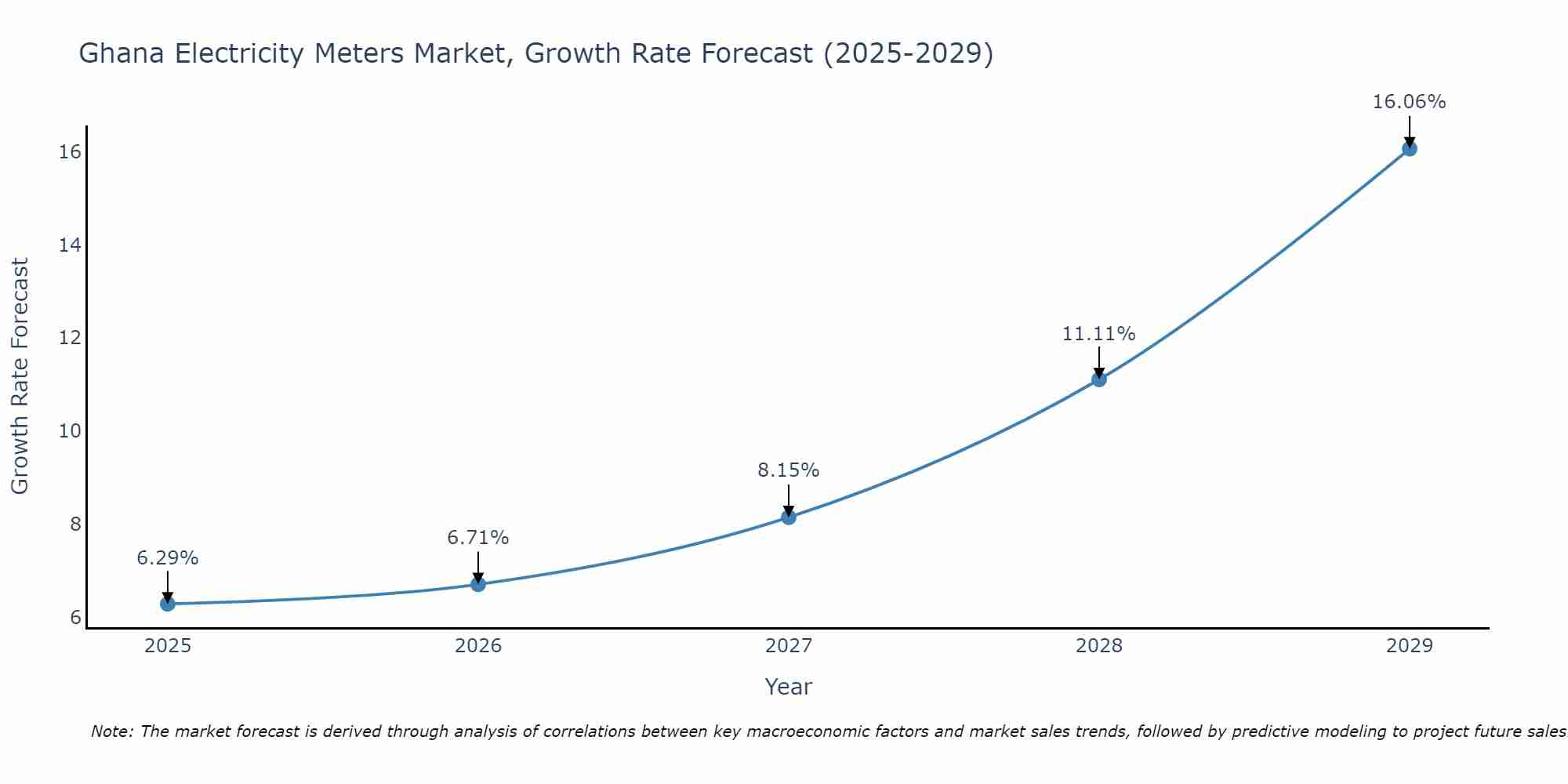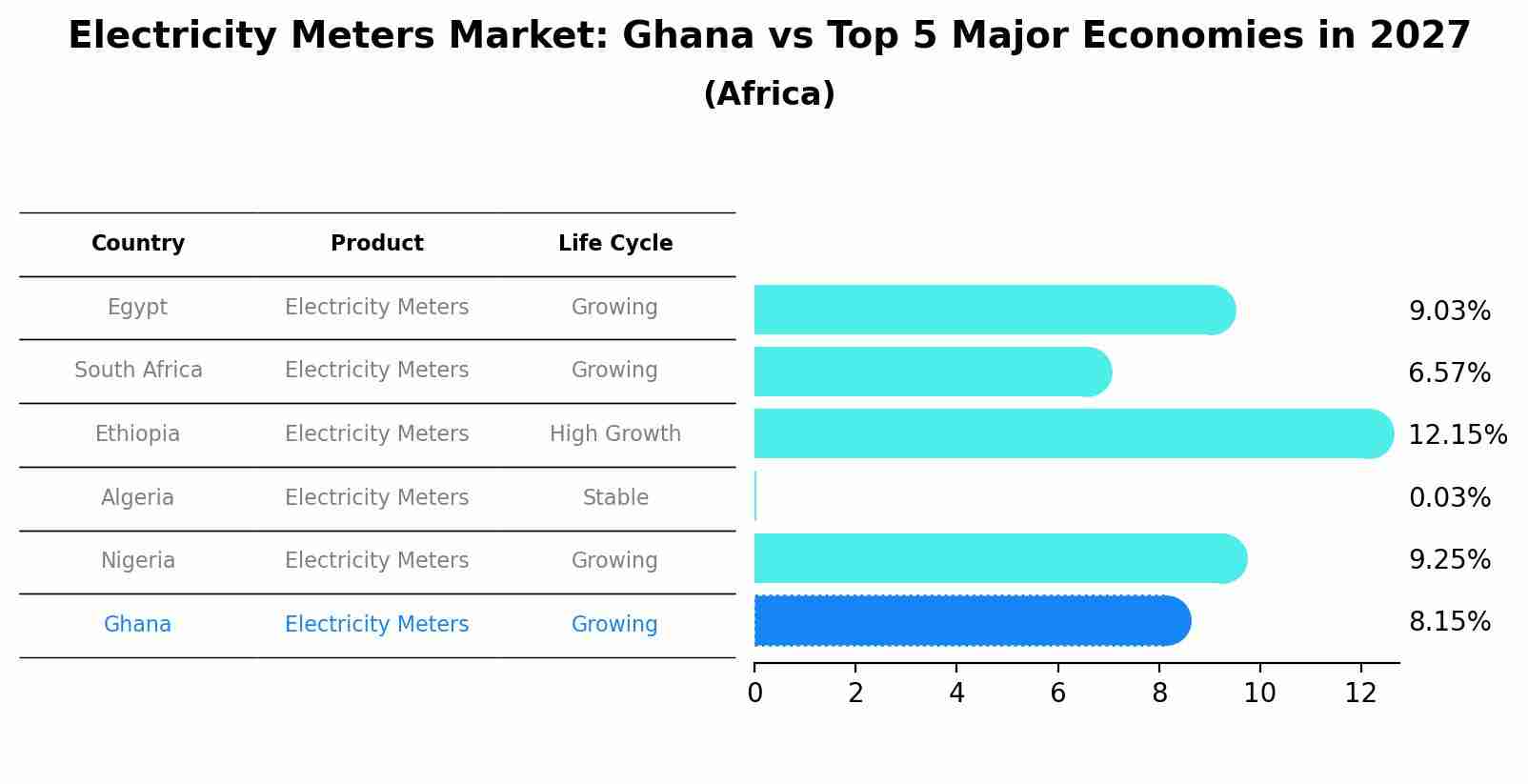Ghana Electricity Meters Market (2025-2031) Outlook | Trends, Companies, Value, Size, Share, Forecast, Analysis, Industry, Revenue & Growth
| Product Code: ETC432952 | Publication Date: Oct 2022 | Updated Date: Jun 2025 | Product Type: Market Research Report | |
| Publisher: 6Wresearch | Author: Summon Dutta | No. of Pages: 75 | No. of Figures: 35 | No. of Tables: 20 |
Ghana Electricity Meters Market Size Growth Rate
The Ghana Electricity Meters Market is likely to experience consistent growth rate gains over the period 2025 to 2029. The growth rate starts at 6.29% in 2025 and reaches 16.06% by 2029.

Electricity Meters Market: Ghana vs Top 5 Major Economies in 2027 (Africa)
The Electricity Meters market in Ghana is projected to grow at a growing growth rate of 8.15% by 2027, within the Africa region led by Egypt, along with other countries like South Africa, Ethiopia, Algeria and Nigeria, collectively shaping a dynamic and evolving market environment driven by innovation and increasing adoption of emerging technologies.

Ghana Electricity Meters Market Overview
The Ghana electricity meters market is witnessing steady growth due to increasing urbanization, industrialization, and government initiatives to improve access to electricity. The market is primarily driven by the need for accurate metering, billing, and revenue collection systems in the country`s electricity distribution sector. Key players in the market include local manufacturers as well as international companies offering a range of prepaid and postpaid meters. The market is also seeing a shift towards smart meters equipped with advanced features such as remote monitoring and data analytics. Despite the growth opportunities, challenges remain in terms of affordability, installation infrastructure, and regulatory frameworks. Overall, the Ghana electricity meters market is poised for further expansion as the country continues to invest in its power sector infrastructure.
Ghana Electricity Meters Market Trends
The Ghana Electricity Meters Market is witnessing a shift towards smart meters as utilities seek to improve efficiency, reduce losses, and enhance customer service. Smart meters offer real-time data monitoring, remote reading capabilities, and integration with advanced metering infrastructure (AMI) systems for better grid management. Additionally, there is a growing focus on prepaid meters to combat revenue losses from non-payment and theft. Renewable energy integration is also a key trend, with meters being equipped to measure and manage electricity generated from solar panels or other sources. The market is becoming increasingly competitive, driving meter manufacturers to innovate with features like mobile payment options, data analytics, and enhanced cybersecurity to meet the evolving needs of utilities and consumers.
Ghana Electricity Meters Market Challenges
In the Ghana Electricity Meters Market, some of the challenges faced include issues with meter tampering and theft, leading to revenue losses for utility companies. Poor meter data management and billing inaccuracies are also common, causing dissatisfaction among consumers and hindering efficient revenue collection. Additionally, the lack of widespread access to reliable electricity supply in certain regions of Ghana poses a challenge to the adoption and installation of electricity meters. Furthermore, the upfront cost of purchasing and installing meters can be a barrier for both consumers and utility companies. Addressing these challenges requires improved metering technology, enhanced data management systems, increased consumer education on the benefits of accurate metering, and strategic investments in expanding electricity infrastructure in underserved areas.
Ghana Electricity Meters Market Investment Opportunities
The Ghana Electricity Meters Market presents promising investment opportunities due to the country`s growing population and increasing urbanization, leading to a rising demand for electricity meters. With the government`s initiatives to improve access to electricity in both urban and rural areas, there is a need for more advanced and efficient metering solutions. Investors can explore opportunities in manufacturing and supplying smart meters, prepaid meters, or other innovative metering technologies to meet the evolving needs of the market. Additionally, partnerships with utility companies and government agencies can provide a strategic entry point into the market. Investing in the Ghana Electricity Meters Market offers the potential for long-term growth and sustainability as the country continues to focus on expanding its electricity infrastructure.
Ghana Electricity Meters Market Government Policy
The government of Ghana has implemented several policies related to the electricity meters market to enhance efficiency and transparency in the distribution of electricity. One key policy is the implementation of Automatic Meter Reading (AMR) systems to improve meter reading accuracy and billing processes. Additionally, the government has mandated the use of prepayment meters to reduce losses from non-payment and theft of electricity. Furthermore, the introduction of a competitive metering market aims to encourage innovation and cost-effective solutions in meter manufacturing and distribution. These policies are part of the government`s efforts to modernize the electricity sector and improve access to reliable electricity services for all citizens in Ghana.
Ghana Electricity Meters Market Future Outlook
The Ghana Electricity Meters Market is poised for significant growth in the coming years. The increasing urbanization and industrialization in Ghana, coupled with government initiatives to improve access to electricity in rural areas, will drive the demand for electricity meters. Additionally, the growing emphasis on energy efficiency and the adoption of smart grid technologies will further fuel the market growth. The introduction of prepaid meters and the increasing awareness about the benefits of digital meters will also contribute to the expansion of the market. As a result, key players in the industry are expected to focus on product innovation, partnerships with utility companies, and expanding their distribution networks to capitalize on the growing opportunities in the Ghana Electricity Meters Market.
Key Highlights of the Report:
- Ghana Electricity Meters Market Outlook
- Market Size of Ghana Electricity Meters Market, 2024
- Forecast of Ghana Electricity Meters Market, 2031
- Historical Data and Forecast of Ghana Electricity Meters Revenues & Volume for the Period 2021 - 2031
- Ghana Electricity Meters Market Trend Evolution
- Ghana Electricity Meters Market Drivers and Challenges
- Ghana Electricity Meters Price Trends
- Ghana Electricity Meters Porter's Five Forces
- Ghana Electricity Meters Industry Life Cycle
- Historical Data and Forecast of Ghana Electricity Meters Market Revenues & Volume By Type for the Period 2021 - 2031
- Historical Data and Forecast of Ghana Electricity Meters Market Revenues & Volume By Single Phase for the Period 2021 - 2031
- Historical Data and Forecast of Ghana Electricity Meters Market Revenues & Volume By Three Phase for the Period 2021 - 2031
- Historical Data and Forecast of Ghana Electricity Meters Market Revenues & Volume By Analog for the Period 2021 - 2031
- Historical Data and Forecast of Ghana Electricity Meters Market Revenues & Volume By Smart for the Period 2021 - 2031
- Historical Data and Forecast of Ghana Electricity Meters Market Revenues & Volume By Application for the Period 2021 - 2031
- Historical Data and Forecast of Ghana Electricity Meters Market Revenues & Volume By Residential for the Period 2021 - 2031
- Historical Data and Forecast of Ghana Electricity Meters Market Revenues & Volume By Commercial for the Period 2021 - 2031
- Historical Data and Forecast of Ghana Electricity Meters Market Revenues & Volume By Industrial for the Period 2021 - 2031
- Historical Data and Forecast of Ghana Electricity Meters Market Revenues & Volume By Others for the Period 2021 - 2031
- Ghana Electricity Meters Import Export Trade Statistics
- Market Opportunity Assessment By Type
- Market Opportunity Assessment By Application
- Ghana Electricity Meters Top Companies Market Share
- Ghana Electricity Meters Competitive Benchmarking By Technical and Operational Parameters
- Ghana Electricity Meters Company Profiles
- Ghana Electricity Meters Key Strategic Recommendations
Frequently Asked Questions About the Market Study (FAQs):
- Single User License$ 1,995
- Department License$ 2,400
- Site License$ 3,120
- Global License$ 3,795
Search
Related Reports
- Portugal Occupational Health & Safety Services Market (2025-2031) | Strategy, Consumer Insights, Analysis, Investment Trends, Opportunities, Growth, Size, Share, Industry, Revenue, Segments, Value, Segmentation, Supply, Forecast, Restraints, Outlook, Competition, Drivers, Trends, Demand, Pricing Analysis, Competitive, Strategic Insights, Companies, Challenges
- Netherlands Occupational Health and Safety Services Market (2025-2031) | Strategy, Consumer Insights, Analysis, Investment Trends, Opportunities, Growth, Size, Share, Industry, Revenue, Segments, Value, Segmentation, Supply, Forecast, Restraints, Outlook, Competition, Drivers, Trends, Demand, Pricing Analysis, Competitive, Strategic Insights, Companies, Challenges
- Belgium and Luxembourg Facility Management Market (2025-2031) | Strategy, Consumer Insights, Analysis, Investment Trends, Opportunities, Growth, Size, Share, Industry, Revenue, Segments, Value, Segmentation, Supply, Forecast, Restraints, Outlook, Competition, Drivers, Trends, Demand, Pricing Analysis, Competitive, Strategic Insights, Companies, Challenges
- Russia Women Intimate Apparel Market (2025-2031) | Strategy, Consumer Insights, Analysis, Investment Trends, Opportunities, Growth, Size, Share, Industry, Revenue, Segments, Value, Segmentation, Supply, Forecast, Restraints, Outlook, Competition, Drivers, Trends, Demand, Pricing Analysis, Competitive, Strategic Insights, Companies, Challenges
- Africa Chocolate Market (2025-2031) | Size, Share, Trends, Growth, Revenue, Analysis, Forecast, industry & Outlook
- Global Hydroxychloroquine And Chloroquine Market (2025-2031) | Industry, Trends, Size, Outlook, Growth, Value, Companies, Revenue, Analysis, Share, Forecast
- Saudi Arabia Plant Maintenance Market (2025-2031) | Industry, Size, Growth, Revenue, Value, Companies, Forecast, Analysis, Share & Trends
- Taiwan Electric Truck Market (2025-2031) | Outlook, Industry, Revenue, Size, Forecast, Growth, Analysis, Share, Companies, Value & Trends
- South Korea Electric Bus Market (2025-2031) | Outlook, Industry, Companies, Analysis, Size, Revenue, Value, Forecast, Trends, Growth & Share
- Africa Low Temperature Powder Coating Market (2025-2031) | Companies, Competition, Size, Challenges, Segmentation, Trends, Competitive, Industry, Supply, Strategy, Investment Trends, Growth, Segments, Restraints, Strategic Insights, Revenue, Share, Forecast, Drivers, Analysis, Pricing Analysis, Demand, Consumer Insights, Value, Opportunities, Outlook
Industry Events and Analyst Meet
Our Clients
Whitepaper
- Middle East & Africa Commercial Security Market Click here to view more.
- Middle East & Africa Fire Safety Systems & Equipment Market Click here to view more.
- GCC Drone Market Click here to view more.
- Middle East Lighting Fixture Market Click here to view more.
- GCC Physical & Perimeter Security Market Click here to view more.
6WResearch In News
- Doha a strategic location for EV manufacturing hub: IPA Qatar
- Demand for luxury TVs surging in the GCC, says Samsung
- Empowering Growth: The Thriving Journey of Bangladesh’s Cable Industry
- Demand for luxury TVs surging in the GCC, says Samsung
- Video call with a traditional healer? Once unthinkable, it’s now common in South Africa
- Intelligent Buildings To Smooth GCC’s Path To Net Zero













